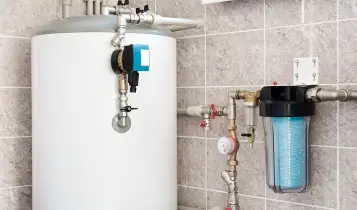
Making the switch to using a well as your primary source of water is no easy feat. It’s essential you know what to look for in a whole-house water filter to make sure the water you’re drinking is as clean and pure as possible.
Decide on the Type of Whole-House Filter
The first thing to take under consideration is to find out what contaminants are in your well water. The best way to do this is to contact a professional plumber who can determine which contaminants you’ll need to remove.
Contaminants in the water can differ from place to place. Common well water contaminants include microbial contaminants (E. coli), heavy metals, fluoride, and nitrates. Knowing what contaminants are in your water is a crucial first step in picking a whole-house water filter for your well water.
The size of the filter you want for your home will also help to determine which type of whole-house filter you’ll need. For the average home, the ideal size of a house filter should be 4.5" x 20". But once again, every system is unique. It’s always best to talk to a professional to determine which size of the filter is best for your home.
Find Out the Flow Rate of Your Dispensers and Appliances
The flow rate of your dispensers and appliances is measured in gallons per minute. The flow rate is the measure of the amount of water that can run through your dispensers, so it’s important you know this before deciding on a well-water filter. If you’re unsure, it’s worth contacting the manufacturer of your appliances who should be able to give you information about the flow rate.
Consider the Type of Water Purification Method Needed
There are several different water purification methods that are available to use in a whole-house water filter:
- Reverse Osmosis (RO) - Reverse osmosis is a type of filtration that uses a semi-permeable thin membrane with pores small enough to let pure water through while rejecting larger molecules. Additional filters in the RO system improve the taste, odor, and appearance of your well water as well. RO systems have very few moving parts, which makes them easy to clean and service. RO system filters require periodic replacement.
- Carbon Filtering - Carbon filtering works by absorption and is a method of filtering that uses a bed of activated carbon to remove impurities from water. Water flows through active carbon filters and chemicals stick to the carbon resulting in purer water output. Carbon filters require periodic replacement.
- UV - UV water purification is one of the most effective ways of disinfecting water. UV rays penetrate harmful pathogens in your home’s water and destroy illness-causing microorganisms. UV rays destroy 99.9% of harmful microorganisms and are often used in conjunction with other filtration systems such as reverse osmosis systems and carbon filtering systems. UV system parts require periodic replacement.
You may also want to consider installing a water softener to treat hard well water. Hard water is water that contains a high mineral content. While generally not considered harmful, calcium, magnesium, and other minerals can damage your appliances. Water softeners remove these elements.
Well, water can be particularly prone to being hard, so implementing a water softener along with a well water filter system will further improve the taste, quality, and purity of your well water.
Mr. Rooter Is Ready to Help
As you can see, professional advice can be useful in determining what steps you need to take to make sure you get the right whole-house water filter for your well water. Your local Mr. Rooter® Plumbing can help you choose the right whole-house water filter and install it. We also install water softeners. Give us a call today or request a job estimate online.
Do you need to have a dedicated circuit installed for a water filtration system? Mr. Electric® can help. Just like Mr. Rooter, Mr. Electric is part of the Neighbourly® community of home service providers. Whether you need help installing a dedicated circuit or changing a light fixture, you can count on your local Mr. Electric for all of your home electrical needs—big and small.